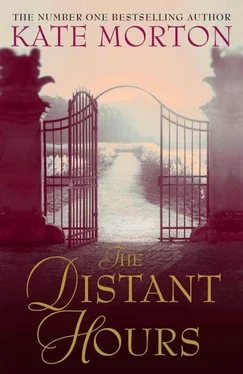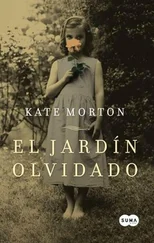Two important things became clear to me as I took the tour: first, Mrs Bird had been underplaying matters when she’d told me Milderhurst was a little shabby. The castle was distressed, and not in a glamshackle way. Second, and more remarkably, Percy Blythe was blind to the fact. No matter that dust smothered the heavy wooden furniture, that countless specks thickened the stagnant air, that generations of moths had been feasting on the curtains, she continued to speak about the rooms as if they were in their prime, as if elegant literary salons were staged, and royalty mingled with members of the literati, and an army of servants bustled unseen along the corridors doing the Blythe family’s bidding. I’d have felt sympathy for her, caught as she was in a fantasy world, except that she wasn’t at all the sort of person who engendered sympathy. She was resolutely un-victim-like and therefore my pity was transformed into admiration; respect for her stubborn refusal to acknowledge that the old place was falling apart around them.
Another thing I feel compelled to mention about Percy: for an octogenarian with a cane she set a cracking pace. We took in the billiard room, the ballroom, the conservatory, then swept on downstairs into the servants’ hall; marched though the butler’s pantry, the glass pantry, the scullery, before arriving finally at the kitchen. Copper pots and pans hung from hooks along the walls, a stout Aga rusted beside a sagging range, a family of empty ceramic pots stood chest to chest on the tiles. At the centre, an enormous pine table balanced on pregnant ankles, its top scored by centuries of knives, flour salting the wounds. The air was cool and stale and it seemed to me that the servants’ rooms, even more than those upstairs, bore the pallor of abandonment, They were disused limbs of a great Victorian engine that had fallen victim to changing times and ground to a final halt.
I wasn’t the only one to register the increased gloom, the weight of decline. ‘Diffi cult to believe, but this place used to hum,’ said Percy Blythe, running her finger along the table’s crenelation. ‘My grandmother had a staff of over forty servants. Forty. One forgets how the house once gleamed.’
The floor was littered with small brown pellets I took at first for dirt but recognized, by their particular crunch underfoot, as mouse droppings. I made a mental note to refuse cake if it was offered.
‘Even when we were children, there were twenty or so servants inside and a team of fifteen gardeners keeping the grounds in order. The Great War ended that: they all enlisted, every last one. Most young men did.’
‘And none came back?’
‘Two. Two made it home, but they weren’t the men they’d been before they went. There were none returned in quite the same shape they’d left. We kept them on, of course – to do otherwise would have been unthinkable – but they didn’t last long.’
Whether she referred specifically to the length of their employment or, more generally, to their lives, I wasn’t sure, and she didn’t leave me pause to enquire.
‘We muddled along after that, employing temporary staff where possible, but by the second war one couldn’t have found a gardener for love nor money. What sort of a young man would be content to occupy himself tending pleasure gardens when there was a war to be fought? Not the sort we cared to employ. Household help was just as scarce. We were all of us busy with other things.’ She was standing very still, leaning on the head of her cane, and the skin of her cheeks slackened as her thoughts wandered.
I cleared my throat, spoke gently. ‘What about now? Do you have any help these days?’
‘Oh, yes.’ She waved a hand dismissively, her attention returning from wherever it had been. ‘Such as it is. We’ve a retainer who comes in once a week to help with the cooking and cleaning, and one of the local farmers keeps the fences standing. There’s a young fellow, too, Mrs Bird’s nephew from the village, who mows the lawn and attempts to keep the weeds in check. He does an adequate job, though a strong work ethic seems to be a thing of the past.’ She smiled briefly. ‘The rest of the time we’re left to our own devices.’
I returned her smile as she gestured towards the narrow service staircase and said, ‘You mentioned that you’re a bibliophile?’
‘My mother says I was born with a book in my hand.’
‘I expect, then, that you’ll be wanting to see our library.’
I remembered reading that fire had consumed the Milderhurst library, the same fire that had killed the twins’ mother, so although I’m not sure what I expected to see behind the black door at the end of the sombre corridor, I do know that a well-stocked library was not it. That, however, is precisely what lay before me when I followed Percy Blythe through the doorway. Shelves spanned all four walls, floor to ceiling, and although it was shadowy inside – the windows were cloaked by thick, draping curtains that brushed the ground – I could see they were lined with very old books, the sort with marbled end papers, gold-dipped edges, and black cloth binding. My fingers positively itched to drift at length along their spines, to arrive at one whose lure I could not pass, to pluck it down, to inch it open, then to close my eyes and inhale the soul-sparking scent of old and literate dust.
Percy Blythe noticed the focus of my attention and seemed to read my mind. ‘Replacements, of course,’ she said. ‘Most of the original Blythe family library went up in flames. There was very little salvageable; those that weren’t burned were tortured by smoke and water.’
‘All those books,’ I said, the notion a physical pain.
‘Quite. My father took it very badly indeed. He dedicated much of his later life to resurrecting the collection. Letters flew hither and yon. Rare-book dealers were our most frequent callers; visitors weren’t otherwise encouraged. Daddy never used this room, though, not after Mother.’
It might have been merely the product of an overactive imagination, but as she spoke I became certain that I could smell old fire, seeping from beneath the new walls, the fresh paint, issuing from deep within the original mortar. There was a noise, too, that I couldn’t place; a tapping sound, unremarkable under normal circumstances but noteworthy in this strange and silent house. I glanced at Percy, who had wandered to stand behind a leather chair with deep-set buttons, but if she heard it at all, she didn’t show it. ‘My father was a great one for letters,’ she said, gazing fixedly at a writing desk within a nook by the window. ‘My sister, Saffy, too.’
‘Not you?’
A tight smile. ‘I’ve written very few in my life and those only when absolutely necessary.’
Her answer struck me as unusual and perhaps it showed on my face, for she went on to explain.
‘The written word was never my métier. In a family of writers it seemed as well to recognize one’s shortcomings. Lesser attempts were not celebrated. Father and his two surviving brothers used to exchange great essays when we were young, and he would read them aloud in the evenings. He expected amusement and exercised no restraint in passing judgement on those who failed to meet his standards. He was devastated by the invention of the telephone. Blamed it for many of the world’s ills.’
The tapping came again, louder this time, suggestive of movement. A little like the wind sneaking through cracks, blowing grit along surfaces, only heavier somehow. And, I felt certain, coming from above.
I scanned the ceiling, the dull electric light hanging from a greying rose, a lightning-bolt fissure in the plaster. It struck me then that the noise I heard might well be the only warning we were to get that the ceiling’s collapse was forthcoming. ‘That noise-’
Читать дальше












